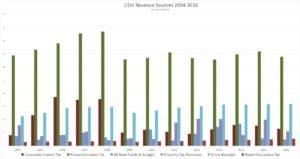
A bill before the Legislature to put commercial part-time villa rentals in the same property tax rate category as time-share units, instead of the rate for residential homes has concerned a lot of owners, who say it would “quadruple” the rate.
But the final rate is not determined, according to Sen. Marvin Blyden, the bill’s sponsor, who pulled the bill from the agenda for hearings scheduled for Friday.
The rate put in the bill was a drafting error, Blyden said Monday in a phone call. He said setting that specific tax rate is not the purpose of the bill, but rather to reclassify commercial villa rentals in a different category than private homes.
Amendments were already planned, he said, but with the amount of concern raised over the bill, Blyden said he pulled the bill for now and will have a town hall on St. John on July 19 to hear from residents and business owners.
“The intent of the bill is to give those that build villa properties with the sole purpose of using them for business (with no intention of using them as a their personal residence) to have their own identity. It will not affect those that rent their properties long term, or use them in the AirBnB-like programs who live in their properties but rent them occasionally. The bill’s intention is to protect the local property owners from being unfairly taxed out of the market, and from losing their homes,” Blyden said in a statement announcing the town hall.
“I encourage you to attend the town hall so you can voice your concerns, to which I am open to hearing,” Blyden said.
As written, the bill in question [Bill 32-0073] is brief and simple. It defines “Villa real property” as residential property that is rented out for any period less than 180 days per renter. It sets the property tax rate at .014070, or roughly 1.4 percent of assessed value., which is the same rate as that for time share units.
V.I. real property tax rates are:
– .003770 or 0.38 percent for residential real property;
– .007110 or 0.71 percent for commercial real property;
– .014070 or 1.4 percent for timeshare real property.
Blyden said the Planning and Natural Resources Department has no separate building and license category for villa rentals properties, so they have traditionally been classified as residential.
The timeshare rate is indeed more than four times the residential rate for the Virgin Islands. However, V.I. property tax rates are low compared to nearly all U.S. jurisdictions.
According to the Tax Foundation, 49 of the 50 states have higher homeowner property tax rates, with only Hawaii, at 0.28 percent, on average, coming in lower. Hawaii’s rates vary by district. Maui has a residential rate of .005540 or 0.55 percent; a hotel/resort rate of 0.94 percent and a time share rate of 1.5 percent. That is slightly higher than the V.I. residential and timeshare rates. The other islands do not have timeshare specific rates. Honolulu has a residential rate of 0.45 percent and a hotel/resort rate of 1.29 percent.
At the higher end, the city of Chicago, Illinois had average residential property tax rates of 7.145 percent in 2016, or about 20 times the V.I. residential rate and five times the V.I. timeshare rate. That city’s southern suburbs have nearly double the rates of the city itself.
The median home value in metropolitan Chicago is about $210,000, according to real estate website Zillow.com. The median home price on St. John is $1.1 million; St. Croix: $403,550 and St.Thomas: $658,460. With very high property values, lower tax rates still cost more.
V.I. property taxes generate about $50 million per year, on average.

Blyden said the purpose of the bill and a second, companion bill, is to provide relief for private homeowners, especially on St. John, who he said are being pushed out of family homes due to the high cost of residential property taxes. He said he wanted to create a separate category for commercial, non-residential rentals, to distinguish them from actual residential homes.
“The mill rate (in the bill) is way too high,” Blyden said, and the final rate in the bill, after it is amended, will be considerably less, he said.
Blyden said he also planned for amendments to exempt homes that people may rent part of, but also live in.
The second bill would create what Blyden called a “circuit breaker,” by granting a tax credit to homesteaders who live in an area where more than 50 percent of the property is federally owned.
St. John is largely federal land. Federal law will not allow different property tax rates within the same district, so that St. John and St. Thomas must have the same rate until or unless an eventual V.I. constitution creates separate taxing jurisdictions. So the territory is prevented from reducing the tax rate just for St. John homeowners.
This “federal land” provision is meant to get around that difficulty.
Blyden said he had gotten an enormous number of phone calls, texts and emails from people concerned about the possible property tax change and was trying to call everyone back.
“Everyone I talked to, they all agree that something must be done for the local St. Johnians, many of whom are in the process of losing their homes. … I do believe this is the solution,” Blyden said.
It is not clear whether a smaller increase for villa owners will appease all opponents.
St. Thomas real estate agent Alana Mawson wrote the Source this week, opposing the idea, arguing it is unworkable and that “there are many residents that also have vacation rentals solely as businesses and derive there income solely from their short-term rentals whose season is quite short, usually mid December – end of April, with summer/fall months basically inactive.”
If the taxes are increased, Mawson argued, what “will happen is vacation rental owners, especially our local residents who depend on this meager income, will either attempt to sell their properties, convert to long term rentals, prices will go up on those that remain and our guests will look to the BVI and neighboring Caribbean Islands for a better value for their money.” (See: An Open Letter to Sen. Blyden in Related Links below)
Blyden’s town hall will be held at 6 p.m. July 19 at the Legislature on St. John, and will be televised on the Legislature channel (Channel 5 on St. Thomas) at the same time.





